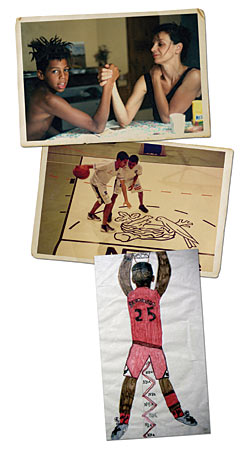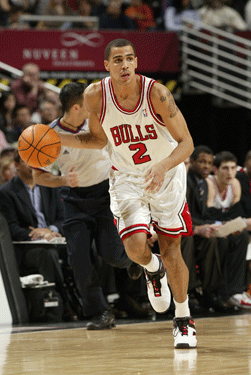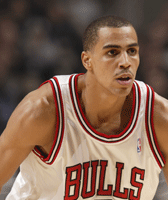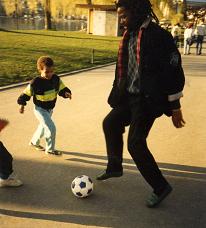THE NEW FACE OF SWITZERLAND
Thabo Sefolosha, NBA rising star is not your typical NBA rising star. He’s part Swiss and part South African: born on Lake Geneva, raised in Montreux; lived in five countries, fluent in three languages, plays a mean shooting guard for the NBA, reads Paul Auster, listens to Method Man…
He’s 23 and for Switzerland, a country with centuries of diversity under its belt— he represents the new guard.
SR: Millions of US viewers watching the playoffs had no idea you’re Swiss. Is it important to you that people know you are from Switzerland?
TS: I want to let them know I’m not from the US or anywhere else but from Switzerland and South Africa. I want to let that be known because I’m proud of where I’m from and all I did to get into the NBA.
SR: To those in the know, (mostly Chicago Bulls fans and your teammates) you are the first Swiss player in the NBA— how does it feel to be the face of Switzerland?
TS: It’s a great feeling to be the first one. Being the best is one thing; when you’re the very first, no one can take that from you. I’m proud of that, being the first and hopefully being able to make basketball better known in Switzerland.
SR: Switzerland is a country mostly associated with the Alps, cuckoo clocks, fondue, and Heidi —
TS: (Laughs) I’ve heard that many times. Yeah, that’s what they know about Switzerland. If they know anything about Switzerland, that’s what they know – they ask me if there’s a lot of snow, fondue, watches—stuff like that. I tell them it’s a nice country that has much more than that.
SR: You’re the first Swiss player in the NBA, and we could also say its first South African player. How do you juggle the dual ambassadorship?
TS: I grew up in Switzerland and learned basketball there, so I talk about Switzerland more when I talk about basketball, but I let people know I’m also from South Africa.
SR: What are the significant cultural differences you’ve had to deal with since moving to the United States?
TS: I think the U.S. and Europe are really different. Everything is fast here; you go to a restaurant you’re in and out. In Switzerland, France, and Italy, it’s more about enjoying the little things that you do. Here it’s more about being efficient.
SR: So you’re in the NBA now, the dream of thousands of talented basketball players all over the world and you’ve just completed your first season—what’s the journey been like?
TS: It was a good season; it was a great experience, just to live in the US and to play in the NBA, especially for a team as successful as the Bulls. That was really great. Living on my own in the U.S., which is farther than France and Italy where I played before—that really made me grow up as far as my personal life. On the basketball side, you’re competing against the best players every day. It demands hard work and you have to be willing to put in that hard work for your own good…I love it!
SR: Next year at the Beijing Olympics it’s likely you will represent Switzerland (if the team gets that far)—alongside your brother Kgomotso who also plays on the Swiss national team. What are your thoughts on playing with your brother—possibly against some of your Bulls’ teammates?
TS: That would be great, but I think we have a long way to go before going to the Olympics. Right now we’re trying to get to group A because we’re in Group B. We’re going to take it step by step. I’m very proud to play for the national team, and playing with my brother is always a special feeling.

From top: Young Thabo arm wrestling his mom, Christine Sefolosha; dribbling with brother Kgomotso; crayola captured fantasy hoops
SR: Your brother was a big part of your basketball childhood. How influential is he in terms of where you are today as a player?
TS: I wouldn’t be here without him. We started playing basketball together. Every time we played we pushed one another. He really helped me with every step I took to get where I am today, so I owe him a lot.
SR: Who was better?
TS: He was. He used to beat me playing one on one all the time. When I moved to France and Italy, we only played in the summer because he was in the U.S. And then I started to win a couple times. Now, I don’t know, it’s been a long time since we’ve played.
SR: Who were some of your basketball heroes when you were growing up?
TS: I didn’t really have one player in particular. It was more like a team. Of course I was watching the Chicago Bulls when they were in the Finals. In Switzerland, it was hard to catch games, so we basically just watched the Finals and a couple games here and there. So I didn’t really have one particular player that I watched, but just the NBA in general.
SR: What does it mean to you to play on a team that carries Michael Jordan’s legacy?
TS: That was a long time ago, but of course they won six NBA championships and there’s a big history there. I’m just proud to be in the NBA. Anything would have been good, but I’m really proud to be part of the Chicago Bulls, which makes it even more special.
SR: Growing up in Switzerland, what was the competition like in the Swiss leagues as a teenager?
TS: Switzerland was good for me because I started playing against semi-professional players on the first-division team when I was 17. So that really made me improve my game, because I was playing against grown men at the age of 17, which is different from the U.S. where, when they’re 19 or 20, against players their age. So I think that really made me improve – the level at that point was good for me.
SR: When did you realize you had skills and the talent to take it to the next level and play in the NBA?
TS: It happened really fast. When I moved to France, I wasn’t on the NBA scouting radar at all. Then I played pretty well the first two years in France and I started to have more and more scouts coming from the U.S. for NBA teams to see me. Then I moved to Italy and played well there as well, and I really believed I had a chance to play in the NBA at that point.
SR: You’re running a basketball camp for kids in Switzerland this summer. Why do you feel basketball is important to Switzerland’s youth at this point?
TS: That’s where I’m from and I wanted to do something for the kids that are in the same situation I was in a couple years ago. It’s just a little something to give back and enjoy. Two weeks with the kids where I’m from. So I hope it’s going to be fun and they’ll learn something at the same time. That’s the purpose of it. It’s for kids from all over. They have a place to sleep and stay or they can just go home if they live close by.
SR: Anything else you’re doing to promote basketball in Switzerland?
TS: Right now, the camp is the main thing I have. I’d like to open some gyms that are open even at night, because usually during the week gyms are closed so people can’t play inside and outside, they can’t play during the winter that much. I’d like to have a couple gyms to be opened especially in Vevey and Montreux, and if that could spread throughout the country, that would be great.
SR: How well is the Swiss national team doing, compared to ten years ago?
TS: We’re working hard and I really think we’re improving. We have a good team and a good coach, and we all believe we can do something in the next four or five years.
SR: Do you think we’ll be seeing more basketball players from Switzerland in the U.S?
TS: I hope so. I don’t know what young players are coming up. It might take some time, but hopefully there will be more Swiss players in the NBA one day.
SR: So basketball in Switzerland is on the upswing?
TS: Yeah, I definitely think so. I also think the crowds respond better now to basketball; they’re more interested in it, and I’m going to try to keep that up and help move it in that direction.
SR: Why is it that the French-speaking part of Switzerland has a bigger basketball following and better teams?
TS: That’s a good question. I don’t know why. Maybe because the cities are smaller, and sometimes when you play in a smaller city, the whole city’s behind the team and cheering? I’m not exactly sure why.
SR: Outside of basketball, what are your other passions and interests?
TS: Just relaxing and seeing friends. I love to be with my friends and family, especially in the summer because I don’t get to see them much during the year. I really like to spend time with them. I read books. I like to read books.
SR: Any favorite authors?
TS: I like Paul Auster.
SR: What are you reading right now?
TS: I’m currently reading “Vanilla and Chocolate,”— my mom gave it to me – it’s the autobiography of a Black American. It’s pretty good.
SR: Both of your parents are artists. What influence did that have on you?
TS: They were both doing what they love and believing in what they were doing – my mom painting and my dad playing music, and I saw that growing up. And my mom always used to tell me, as long as you do what you love to do, things will go your way. That was something they taught me that really stuck with me. That’s what I did. I believed in myself, played hard and did what I love.
SR: Your mother’s Swiss and your father’s South African. Did that create any challenges for you growing up in Switzerland?
TS: Not really. I wish I could’ve gone to South Africa earlier, because the first time I went there I was 18 years old. That was just part of me growing up, not knowing exactly where I was from – that part of the family. Not knowing my grandma and cousins and all that. I always wished I could do that earlier. Now I’ve done it…that was the only thing growing up for me that really was challenging.
SR: There’s a famous jazz festival in your hometown of Montreux. Was that an influence, especially since your father’s a musician?
TS: It did have an impact. It was always fun to go there and just hang out and see a concert. My dad used to take me and my brother to see concerts, so the Montreux Jazz Festival was something great that we looked forward to every year.
SR: Any memorable moments?
TS: I remember seeing Trilok Gurtu with my dad once – that was great. I saw Alicia Keys maybe three years ago— I don’t remember them all…
SR: Living in the U.S., playing in the NBA, you’re living the dream—but what do you miss most about Switzerland?
TS: My family and friends, and the food, just going in the supermarket and knowing exactly what I want and where it is. That’s something that I miss.
SR: And your long-term plans and goals?
TS: As an athlete, I just want to stay in the NBA as long as I can have an impact on the team. Being able, within maybe two years, to be in the starting five, playing a major role on the team. And hopefully in a couple years winning a championship. I’d like to do that. Personal goal – to play basketball and get ready for my life after basketball as well.
More information about Thabo Sefolosha:
Official Website of Chicago Bulls http://www.nba.com/bulls/
Thabo’s Website http://www.thabosefolosha.com/
Swiss Basketball http://www.swissbasketball.ch/cms/index.php?id=3&L=0



